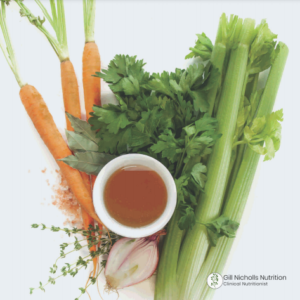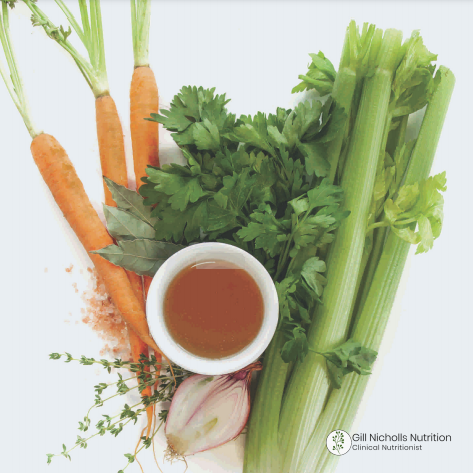Support your immune health this winter.
Written By Gill Nichols.
It’s the beginning of winter and as the seasons change colds and flu usually come out in colder weather, we experience different pollens which can also test our immune system and the potential for getting sick increases.
Here are some simple ways to support your immune system this winter.
- Make some broth
Vegetable and bone broths are an ancient tradition in many cultures dating as far back as the 12th century. Soups, in particular chicken soup, has been studied for its positive effects of reducing cold and flu symptoms.
Bone broth is a magical immune boosting gut healing liquid.
The temperature of a good wholesome broth can help keep us warm and you can load it up with a tonne of greens, root veggies, and herbs that have natural healing properties. The old Chicken soup even was credited scientifically recently for its positive effects on immune health.
Comforting, warming and nourishing and so easy to make. It tastes delicious on its own and adds wonderful flavour to soups, stews and stir-fries. Bone broth is usually simmered for up to 12- 24 hours so that all the nutrients and minerals such as magnesium, calcium and phosphorous can be extracted. Because broth is easy to digest the nutrients are easy for the body to absorb making them more available to the body especially helpful in supporting the immune system and digestion.
Bone broth is also a source of collagen that forms structural building blocks of skin and the cells which line the gut. So, your skin and hair will also benefit from the addition of some bone broth into your diet. Anti-inflammatory compounds such as glucosamine and chondroitin are released as cartilage is broken down which help our joints remain flexible. To assist in this breakdown, add a splash of apple cider vinegar to the stock when cooking.
Simple Broth recipe

4 litres filtered water
1 Organic chicken carcass
3 celery sticks, chopped
3 carrots, chopped
2 onions, chopped
1 teaspoon sea salt
1 teaspoon pepper
2 bay leaves,
1/8 cup organic Apple cider vinegar (substituting leeks, thyme, fennel, parsley, are all great options)
Add all ingredients to a pan and bring to a boil, then reduce to a simmer and cover.
Cook for 6-10 hours. If you have histamine issues cook for a max of 2 hours.
Wait till cool, strain and refrigerate.
Once you have made your broth it’s easy to use a base for other soups like the delicious anti-inflammatory Carrot and ginger soup recipe below.
Carrots are full of beta carotene which we convert into vitamin A. Vitamin A is important for healthy mucus membranes which is our first line of defence against viruses and bacteria. As Beta-carotene requires dietary fat for conversion into Vit A add a splash of extra virgin olive oil to serve. This makes the soup creamy and will help keep hunger at bay for a few hours. Olive oil is also full of plant chemicals and oleic acid which have anti-inflammatory effects. If you don’t have olive oil you could sub in half the stock with half a can of coconut milk which will make a really creamy soup.
Fresh ginger has potent anti-inflammatory qualities and is widely studied for its health benefits. It has gained interest for its potential to treat lung and heart disease and is known to be effective at treating and preventing nausea and lowering blood sugar levels. It also adds warmth to this soup and is a perfect pairing with carrots.
Carrot and ginger soup
| Recipe |
| ?1.5 litres stock (chicken or vegetable) or ½ and half with can of coconut cream |
| ?1 piece ginger root (about thumbnail size) or two tablespoon minced ginger |
| ?1.5 kg carrots roughly chopped |
| ?2 large zucchinis |
| ?Splash Extra virgin olive oil to serve |
Method
?Put stock, carrots, and ginger in large pan and simmer until carrots are tender (around 25 mins)
?blend using a stick blender or food processor
?Season with salt, pepper or chilli flakes, and splash of olive oil
- Get adequate protein
No one food will magically fend off the flu but certain nutrients lead the way in protecting your body from the billions of bacteria and viruses they come in contact with. Protein is a key one. The immune system is built on protein and food high in protein contains additional immune boosting nutrients. Good sources include organic tofu, chicken, seafood, lean beef and legumes.
These also contain zinc which is key in the production of infection fighting white blood cells. Including quality lean protein at every meal will help improve your immune system. Eating protein with every meal will also help stabilize blood sugars which has a positive effect on your immune system and will stop you from reaching for sugary snacks. Sugar has a depressive effect on your immune system. Using this simple hack will mean that you won’t need to use will power to avoid sweet temptations you will have less sugar cravings.
- Eat a variety of brightly coloured Vegetables
Eating brightly coloured fruit and veg rich in Vitamin A, C and E will also support white blood cell production and protect against disease. By making meals as colourful as possible and adding a variety of greens, oranges, yellows and reds you will get all the good stuff you need to help fight disease. Diversity in plant food has been linked with increased diversity in gut bacteria i.e., your microbiome. A diverse microbiome is a healthy one which will protect you.
- Spend time in the sunshine
New research highlights the integral role Vit D plays in immune response. Sunshine helps to energize out T cells (Thymus cells) which are the first cells in our immune response. The sunshine increases their motility helping them movement which in turn increases hydrogen peroxide production which is released by our white blood cells to kill invading bacteria and viruses. I love the image of the sunlight waking up our immune cells into action.
New research highlights the integral role Vit D plays in immune response. Low levels of Vitamin D have been linked to increase in colds and flu. Getting your levels checked is a great idea and going for a walk outside each day for 20 mins a day will reduce your risk of illness.
- Optimize sleep
Sleep is one of the best things we can do to improve our health. Unfortunately, we are now sleeping less than we did and have lower sleep quality than ever before. Having regular good quality sleep can improve glucose metabolism and immunity. In fact, nearly all of our body systems are affected by poor sleep particularly hormones, cognition and immunity.
If you want to improve your health, getting a good night’s sleep is one of the best things you can do. Regulating your sleep wake cycle is key. Blue lights from screens can disrupt this. Simple hacks like getting exposure to sunlight not your phone first thing in the morning and avoiding your phone at night (or using blue light filters or glasses) will help reset this sleep wake cycle. Blue light from electronic devices disrupts both early morning and evening circadian rhythms confusing our bodies and hormones.
Melatonin is needed to help us relax and sleep. Melatonin also acts as an antioxidant in the body fighting any free radical damage so when we don’t produce enough, we have poor sleep, hormone irregularities and are more likely to catching colds and flu.
I love creating a sleep routine with clients which includes things they enjoy: Listening to podcasts, reading or journaling. Enjoying a cup of herbal tea, doing some gentle stretches colouring, listening to music or just tidying the bedroom. Whatever works. Your body will thank you.
This post is meant for general education purposes only and does not constitute or replace specific advice from your health care practitioner. Always practice good hygiene such as covering your face when you cough or sneeze, washing your hands regularly and wiping down surfaces.
If you would like to book a consultation with Gill she is currently in the clinic on Tuesdays and is offering a 15% discount on all initial consultations in June and July.








